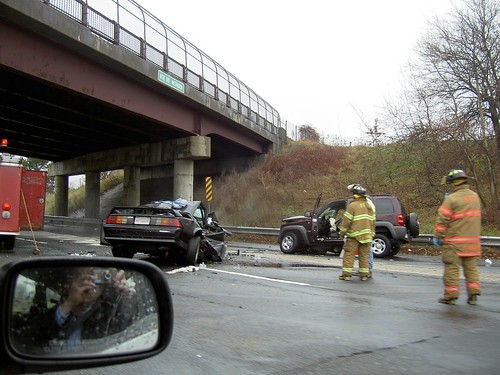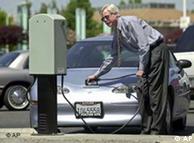(Source: Office of Planning, Environment and Realty Federal Highway Administration)
Recent Events
U.S. Senator Barbara Boxer Announces Principles for Global Warming Legislation. On February 3, Sen. Barbara Boxer (D-CA) announced her intent to move quickly on global warming legislation and issued principles that she would like to see included. These include setting short and long term emissions targets that are certain and enforceable, using a carbon market to fund various efforts to reduce GHG emissions, and ensuring a level global playing field so that countries contribute their fair share to GHG emissions reductions. For more information including a link to Sen. Boxer’s Principles, see the Committee’s press release.
House Subcommittee Receives Testimony on Surface Transportation Energy Reduction.On January 27, the House Transportation and Infrastructure Subcommittee on Highways and Transit heard from nationally recognized transportation experts and a panel of industry representatives about ways to reduce energy consumption and promote sustainability in the surface transportation sector. Video of the proceedings and written testimonies (scroll down) are available on the Subcommittee website.
United Nations Conference on Trade and Development Holds Meeting on Maritime Transport and the Climate Change Challenge. On February 17, FHWA’s Mike Savonis presented (via videoconference) results from USDOT’s Gulf Coast Study Phase I to an international audience in Geneva. Additional information and presentations from the three-day event are available on the meeting website.
U.C. Davis Provides Congressional Briefing on Low-Carbon Transportation Policies & Strategies. On January 12, 2009, the University of California at Davis (UC Davis) Institute of Transportation Studies provided a briefing to Congressional staffers on the future of low-carbon transportation. More information about UC Davis climate change activities is available on the UC Davis ITS website. (TransportGooru is proud to share a video of UC Davis’s Dan Sperling Talk about the current Transportation system and its effect on Climate change. See below)
House Subcommittee Conducts Hearing on Monitoring GHG Emissions. On February 24, the House Science and Technology Subcommittee on Energy and Environment conducted a hearing on how to monitor, report and verify greenhouse gas emissions. The purpose of the hearing was to determine the federal role in the funding of research and development of monitoring technologies as well as models to support reliable baseline data for GHG emissions. The subcommittee heard testimony from businesses, government agencies, and localities on procedures and methods that can be used to monitor, report, and verify greenhouse gas emissions. More information can be found on the Committee’s website at: http://science.house.gov/publications/hearings_markups_details.aspx?NewsID=2359
State News
Oregon Governor Introduces VMT Fee Legislation. Following a study on charging a Vehicle Miles Traveled (VMT) fee in place of a state gas tax, the Governor of Oregon introduced legislation that could move the state closer to adopting a per mile road user fee in place of the 24-cent per gallon gas tax. Governor Kulongoski’s Jobs and Transportation Act of 2009 requires the Oregon DOT to develop VMT fee collection technology that could be used to replace the gas tax. The Act also directs Oregon DOT to further study gas tax alternatives.
Regional Greenhouse Gas Initiative Enters First Compliance Period. The ten signatory states to the Regional Greenhouse Gas Initiative (RGGI) began their first compliance period on January 1, 2009 and the period ends in December 2011. At that time the ten Mid-Atlantic and New England states will be required to submit emissions allowances equivalent to their carbon dioxide emissions. For more information on the program, see the Pew Climate Center RGGI website.
Announcements
New Energy and Climate Change Database for Planners. The American Planning Association has launched a new database of energy and climate change activities in planning. You can search the database by a variety of criteria such as state, topic, planning tool, timeframe, or geographic scale. The database includes many examples relating to transportation. The database website iswww.planning.org/research/energy/database.
Summit on America’s Climate Choices, March 30-31 in Washington, D.C. Congress has tasked the National Academies with setting the stage for national action on climate change. In response, the Academies have launched America’s Climate Choices, a suite of activities that will provide policy advice, based on science, to guide the nation’s response to climate change. Experts representing various levels of government, the private sector, nongovernmental organizations, and research and academic institutions have been selected to serve on four panels and an overarching committee. The Summit on America’s Climate Choices provides an opportunity for study participants to interact with major thought leaders and key constituencies to frame the questions and issues that the study will address. Registration and webcast information are available on the Summit website. In addition to the summit, NAS is soliciting public input on the questions and content to be considered by the America’s Climate Choices Committee through the America’s Climate Choices website through April 17.
Reminders
Washington State Department of Transportation Climate Change Weekly Digest, The Washington State DOT has an extensive Climate Change program and the Climate Change Team issues a weekly digest on climate change issues. For more information on WSDOT’s climate change activities see WSDOT’s climate change website. To be put on the email list to receive the weekly digest, please send a note to:StarkS@wsdot.wa.gov.
U.S. DOT Launches Web-Based Clearinghouse of Transportation, Climate Change Resources. The USDOT has launched a new, web-based clearinghouse of information on transportation and climate change. The site provides an introduction to climate change and transportation and related information on greenhouse gas inventories and forecasts, methodologies for analyzing greenhouse gases from transportation, climate change and adaptation, and federal, state and local actions on transportation and climate change. The site also includes a calendar of events and will soon be enhanced to provide an opportunity for users to post and respond to discussions and receive updates by email. To access the site, go to: http://climate.dot.gov.
Transportation Research Board Starts a New Climate Change website. Transportation Research Board (TRB) has a new website offering information on TRB activities and products addressing transportation and climate change.







